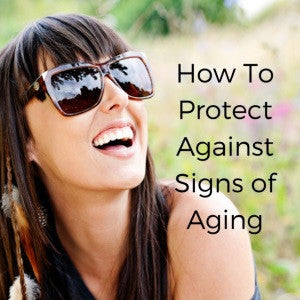
How to Prevent Skin Aging
We all get older — there’s just no way around it.
There are many things I love about getting older, like having my own business. Still, many of us don’t want signs of age showing up on our skin. That’s where science comes in. Recent advances in dermatology have made it much easier to keep our skin looking healthy and youthful as we get older.
In this post, we’ll go through those options and examine the root causes of skin aging.
Why Does Our Skin Age?
Experts are still investigating the science behind the aging process, but most agree it’s a combination of intrinsic factors (like genetics) and extrinsic factors (like your lifestyle and environment).
The good news is, there are steps you can take to control those extrinsic factors. Your diet, exercise habits, sleep schedule, and skin care routine may all play a role, but the number one cause of visible skin aging is exposure to sunlight.
In fact, some experts go as far as to say that 80-99 percent of the changes we see on our skin as adults are caused by exposure to sunlight. That includes wrinkles, loss of elasticity, and thinning of the skin, not just discoloration.
So, what can we do to stop that?
Protect Your Skin From the Sun
No matter how old you are, avoiding sun damage is one of the easiest and most important measures you can take when it comes to your skin.
Sunscreen is your biggest ally. Look for a sunscreen with both UVA and UVB protection, and apply it to all exposed skin, not just your face. Remember not to neglect your hands, especially when you’re driving.
Sunscreen isn’t just for sunny weather either. For daily use, look for a moisturizer with SPF 30 or higher.
If you get sunburned, make sure you do everything you can to help your skin heal. Drink a lot of water and keep the burned area moisturized. A combination of high quality cream and aloe vera gel can be really soothing!
Sun protective clothing is ideal if you’re looking to protect your skin. Well-made sun protective clothing is different from your average long sleeved shirt. The fabric is actually made differently. The best quality sun protective clothing is designed to block 98% of UV rays. A regular T-shirt lets in about 20%.

You can learn more about sun protective (UPF) clothing here.
Stick to a Skin Care Regime
Every good skin care regime involves a good sunscreen or moisturizer with SPF, but there’s more to it.
It’s about having a plan and sticking to it. Your skin care routine doesn’t have to be overly complicated or expensive. In fact, simplicity is usually better, and you can find many excellent dermatologist-recommended products without spending hundreds of dollars.
Cleaning your face regularly is one of the best things you can do for your skin. How often you wash your face and which products you choose will depend on your skin type, but look for something gentle and non-drying. Talk to your dermatologist and experiment on your own to see what works best for you.
And if you wear makeup, always wash it off before bed. Leaving makeup on through the night is drying and generally terrible for your skin.
Anti-aging products, whether they’re over the counter or prescription, can make a big difference. Look for products containing:
- Antioxidants, like vitamins C or E
- Retinoids, to fight wrinkles
- Hyaluronic Acid, to moisturize and encourage collagen production
Sleep Well
Between errands, family responsibilities, and work, getting enough sleep isn’t easy. A significant percentage of adults in the US regularly don’t get a good night’s sleep.

According to WebMD, when we get too little sleep, our bodies produce more of the stress-related hormone, cortisol, which can break down the collagen in your skin. Collagen is a protein that helps keep your skin firm, elastic, and producing new skin cells. Not sleeping enough night after night can stop that process from happening.
Of course, not everyone needs the same amount of sleep each night. Some people need more than others. The National Sleep Foundation released some general recommendations, but ask yourself these questions to try to figure out if you’re sleeping enough:
- Do you feel tired or sleepy during the day?
- How long does it take you to fall asleep at night? (15 minutes is about right for most people.)
- Do you depend on caffeine to stay awake during the day?
- Do you often find it hard to concentrate or remember simple things?
- Do you constantly fall asleep watching movies or TV?
These are all potential indications you may not be getting enough shut eye, especially if you’re struggling with more than one.
Check with your doctor if any of those symptoms are severe or if you consistently find yourself lying awake at night.
Avoid Cigarettes
New research shows smoking as a major contributor to premature aging, most likely due to decreased blood flow to the face and damage from consistent exposure to toxic chemicals.
Also, many smokers often subconsciously squint to protect their eyes from the smoke, which contributes to eye-wrinkles called crow’s feet.
If you’re a regular smoker, though, quitting is much easier said than done. Giving up cigarettes requires a lot of commitment and perseverance. If you’re ready to stop smoking, here are some resources to help you out:
- Tips and resources from the CDC
- Tools, advice, and technology for every step of the process from SmokeFree.gov
- An analysis of the different quitting methods from WebMD
Make a Healthy Diet and Exercise Plan
A good diet and regular exercise is as good for your skin as it is for the rest of your body.
Eating healthy foods and drinking plenty of water gives your skin the nutrients it needs to stay young-looking and make new skin cells.
Focus on eating nutritious fruits and vegetables, like tomatoes, citrus, carrots, and leafy vegetables. Also try to limit your sugar and alcohol intake.
Then, working out at least a few times a week improves circulation to the skin in your face and may even reverse the skin’s aging process. You don’t have to train like an Olympian either! Even a short walk or jog a couple times a week can help.

If you have trouble motivating yourself, as many of us do, arranging to work out with a friend can help you craft a plan and stick to it!
What Did I Miss?
These are the best tips from my research on preventing skin aging. Most dermatologists seem to agree that sun protection is rule number one. And protecting your skin isn’t just important in the summer. UV rays can still damage your skin on cold and cloudy days.
Sun-protective pullovers, cardigans, and our versatile endless wraps are great for colder weather!
Do you have a great anti-aging tip I didn’t include? Do you use another method for keeping your skin youthful? Share your experience in the comments below! I’d love to hear your story.



